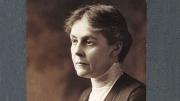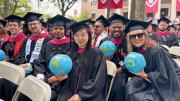In a speech at Harvard on December 4, Mikhail Gorbachev, the man who led the Soviet Union from 1985 until its dissolution in 1991, urged today’s world leaders to place nuclear disarmament at the top of their agendas.
Because a key weapons treaty is set to expire in 2009, and talks on replacing or extending it have not begun, “The responsibility of the current two presidents is very great,” Gorbachev said through a translator.
When Gorbachev came to power, he recalled, “People at the time were saying one thing… ‘Do whatever you can to prevent nuclear war.’ ” Nowadays, he said, those concerns are not the foremost worry on people’s minds. Gorbachev called for making them a top priority once again: “If you don’t move forward, sooner or later you begin to move backward.”
Gorbachev delivered the Albert H. Gordon Lecture on Finance and Public Policy. The next day, he was scheduled to meet with policymakers — 15 Russian, 15 American, and 15 from other countries — to discuss the lessons of nonproliferation treaties and the current nuclear horizons.
During his speech, he called for full nuclear disarmament: “Not overnight, but quickly, we should move toward that goal.”Although many nations – including China, India, Brazil, Iran, and the European Union members – “need to enter the conversation,” Gorbachev said, “It is for Russia and the United States to take the initiative” because of their historic role with regard to nuclear weapons, and because they still have the world’s largest stockpiles of such weapons.
Gorbachev spoke for an hour before a packed John F. Kennedy Jr. Forum at the Kennedy School of Government, and then took questions for nearly another hour.
An undergraduate representing a group of students who were born in the Soviet Union asked Gorbachev whether he regrets the fact that the USSR no longer exists. Gorbachev called the USSR’s collapse “the biggest failure in my political career.” What was intended as decentralization snowballed into dissolution because, Gorbachev said, “There was a big battle within the Party…There were some people who took advantage of that situation.…I still believe the union could have been preserved.”
Gorbachev offered some criticisms of current U.S. foreign policy, accusing the United States of trying to build “a monopoly on global governance.” He was critical of “a militarization under way in the U.S.,” calling it “a kind of disease.”
And he called for building “a united Europe, from the west and from the east.” He said prospects existed for Russia and Ukraine to form a common economic space that could have been “a good partner to the European Union,” but those prospects waned with the 2004 elections, where Ukrainians chose the anti-Russian over the pro-Russian presidential candidate.
When Graham T. Allison, Dillon professor of government and director of the Belfer Center for Science and International Affairs, tried to cut off questions and end the event, Gorbachev interrupted Allison and offered to take one more question from each of the four audience microphones.
Although the title of Gorbachev’s talk was “Overcoming Nuclear Danger,” listeners who asked questions seemed equally interested in hearing Gorbachev’s take on Russia’s current political situation. But Gorbachev’s responses were either polite dodges or cryptic replies."
If you were the president of Russia right now, what would you be doing differently?” one audience member asked.Gorbachev’s response: "I don’t reply to such questions."Asked about the results of this week’s parliamentary elections in Russia, Gorbachev answered elliptically. The ruling party, United Russia, now "has to pay back bargains it made," he said. If the party doesn’t pay back those bargains, he said, "You know what happens."





